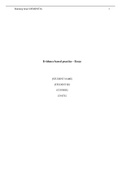Running head: DEMENTIA 1
Evidence based practice - Essay
[STUDENT NAME]
[STUDENT ID]
[COURSE]
[DATE]
, DEMENTIA 2
Evidence-based practice - Essay
Dementia is a disease that declines an individuals’ ability to memorize and recall which is caused
by the death of brain cells. Dementia disables a persons’ ability to perform day to day activity.
Dementia is not a single disease (like related to a heart) but is more like a group of symptoms that
gradually affects the normal routine, activities and memory of a person (Zhang et al., 2017). There
are different models that involve different treatments of this disease. This essay explores the past
literature related to contemporary dementia care practices. In order to narrow down the research,
two contemporary models of dementia care are taken and are critically analyzed to discover the
effectiveness of both.
Dementia is a wide range of brain disorders typically of a persistent and continuous nature that
causes gradual decline/degeneration in the mental capacity (i.e. the ability to think) of an individual
beyond the standards of natural ageing (Budson & Solomon, 2011). It primarily impacts memory,
comprehension, perception, calculation, language, motivation, judgment etc. However, it usually
does not impact consciousness (WHO, 2019). The incidence of dementia rises substantially with
age, with the psychological and behavioural manifestations of dementia greatly leading to
compromised welfare and quality of life (Crespo, Hornillos & De Quirós, 2013). Subsequently,
dementia is far more prevalent in long-standing care facilities than in the community level, creating
significant obstacles for care providers, and efficient methods and interventions are crucial for
enhancing the situation of dementia patients within such settings/environments (Seitz, Purandare
& Conn, 2010). Cognitive dysfunction is usually associated with, or often accompanied by, a
decline in emotional regulation, social activity or motivation. There are numerous forms of
dementia. The most prevalent type is Alzheimer's disease which may account for 60% to 70% of
the cases. Other common types include vascular dementia (25%), dementia with Lewy bodies




